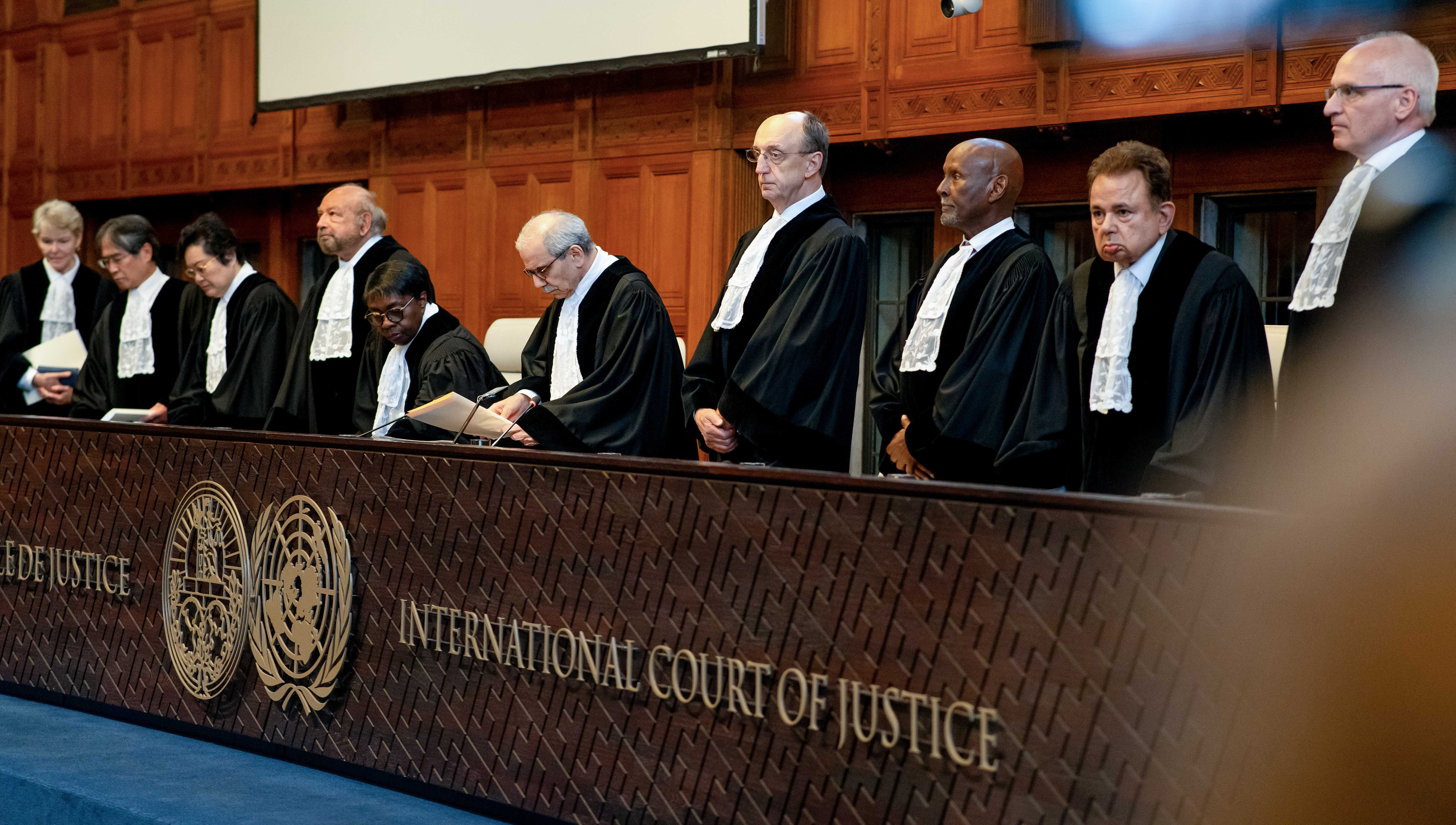ANC Secretary-General Fikile Mbalula has welcomed a landmark advisory opinion issued by the International Court of Justice (ICJ) that states Israel’s continued presence in Palestinian territory is unlawful and must be brought to an end.
/file/dailymaverick/wp-content/uploads/2024/07/12269145.jpg)
In a statement released on Saturday, Mbalula said the ANC had long held that the “continued annexation and the occupation” of Palestinian land was incongruent with international law.
“The court has stated that Israel must withdraw without delay and provide reparations for the damages caused in Palestine. It is crucial to note that all countries are urged not to acknowledge Israel’s unlawful occupation or support its continuation,” he said.
“Given that this opinion was requested by the United Nations General Assembly, it confirms the illegality of Israel’s occupation of Palestine … and requires other nations to ensure Israel’s withdrawal and not assist in its occupation.
“The ANC affirms its solidarity with the people of Palestine.”
Emma Powell, the DA spokesperson for international relations and cooperation, told Daily Maverick that the DA respected the ICJ’s ruling and called on all parties to abide by it.
The ICJ’s advisory opinion on the legal consequences of Israel’s policies and practices in occupied Palestine, including East Jerusalem, was delivered on Friday, 19 July. This was more than eight months after the Israel-Gaza war broke out, a conflict that has been described as a genocide against the Palestinian people by many activists in South Africa and other countries.
The Palestine Ministry of Health in Gaza put the number of people killed by Israeli forces since the outbreak of the war at 38,848 on 18 July. Israel’s attack followed an assault by Hamas on 7 October that killed about 1,200 people.
Read more: Middle East crisis news hub
The ICJ declared Israel’s continued presence in the Occupied Palestinian Territory since 1967 unlawful, constituting a 57-year occupation.
“By 14 votes to one, [the ICJ] is of the opinion that the state of Israel is under obligation to cease, immediately, all new settlement activities, and to evacuate all settlers from the Occupied Palestinian Territory,” said Judge Nawaf Salam, the president of the ICJ.
“By 14 votes to one, [the ICJ] is of the opinion that the state of Israel has the obligation to make reparations for the damage caused to all natural or legal persons concerned in the Occupied Palestinian Territory.”
/file/dailymaverick/wp-content/uploads/2024/07/12269129.jpg)
Palestinian Prime Minister Mohammad Mustafa welcomed the ICJ’s advisory opinion and called on Israel to comply with the outcome of the proceedings. However, Israeli Prime Minister Benjamin Netanyahu was quick to denounce the ICJ’s ruling as “absurd”.
“The Jewish people are not occupiers in their own land, including in our eternal capital Jerusalem nor in Judea and Samaria, our historical homeland. No absurd opinion in the Hague can deny this historical truth or the legal right of Israelis to live in their own communities in our ancestral home,” he said in a post on the social media platform X (formerly Twitter).
Palestine welcomes ICJ's ruling on Israel's occupation of Palestine, calls for Israel's compliance.
— PM of Palestine (@PalestinePMO) July 19, 2024
The Jewish people are not occupiers in their own land, including in our eternal capital Jerusalem nor in Judea and Samaria, our historical homeland. No absurd opinion in the Hague can deny this historical truth or the legal right of Israelis to live in their own communities in…
— Benjamin Netanyahu - בנימין נתניהו (@netanyahu) July 19, 2024
Violations of international law
According to an Al Jazeera report, the ICJ’s ruling is a non-binding advisory opinion, which was sought by the United Nations General Assembly in 2022 to provide clarity about the legal implications of Israel’s occupation of the West Bank.
The ICJ determined that the Palestinian territories in which Israel was an occupying power included the West Bank and East Jerusalem. When it came to the Gaza Strip, it stated that Israel’s obligations under the law of occupation were commensurate with the degree of its effective control over the territory.
In 2004, Israel announced a disengagement plan under which it aimed to withdraw its military presence from the Gaza Strip. However, the ICJ noted that “For the purpose of determining whether a territory remains occupied under international law, the decisive criterion is not whether the occupying power retains its physical military presence in the territory at all times but rather whether its authority has been established and can be exercised.
“Based on the information before it, the Court considers that Israel remained capable of exercising, and continued to exercise, certain key elements of authority over the Gaza Strip, including control of the land, sea and air borders, restrictions on movement of people and goods, collection of import and export taxes, and military control over the buffer zone, despite the withdrawal of its military presence in 2005. This is even more so since 7 October 2023.”
According to the ICJ, Israel’s status as an occupying power means that it assumes a set of “powers and duties” for the territory over which it exercises effective control. In examining Israel’s settlement policy in occupied Palestine, it found the state to be in violation of international law.
Israel’s violations of international law included:
- Its transfer of settlers to the West Bank and East Jerusalem, as well as its maintenance of their presence, which is contrary to Article 49 of the Fourth Geneva Convention. Paragraph six of Article 49 states that an occupying power cannot transfer parts of its civilian population into the territory it occupies.
- Its expansion of Israeli settlements in the West Bank and East Jerusalem through the confiscation or requisitioning of large areas of land, which means that its land policies are not in conformity with articles 46, 52 and 55 of the Hague Regulations.
- Its diversion of a large share of natural resources in the occupied territory for its own population, including settlers, and its restriction of access to water for the Palestinian population in the occupied territory.
- The expansion of its sphere of legal regulation in the West Bank, as well as its imposition of domestic Israeli law on East Jerusalem. This is inconsistent with Article 43 of the Hague Regulations, which states that an occupying power must in principle respect the law in force in the occupied territory unless absolutely prevented from doing so.
- The forced displacement of Palestinian people from occupied territories through measures such as forcible evictions, extensive house demolitions and restrictions on residence and movement.
- The violence perpetrated against Palestinians by settlers and security forces, due to Israel’s settlement policy.
Echoes of apartheid
The ICJ’s advisory opinion examined whether legislation in occupied Palestine was discriminatory. To this end, it looked at Israel’s residence permit policy for Palestinians in East Jerusalem; the restrictions imposed on the movement of Palestinians in the occupied territory; and Israel’s practice of demolishing Palestinian properties in the West Bank and Jerusalem. It noted that almost 11,000 structures had been demolished since 2009.
“The Court concludes from the evidence presented to it and on the basis of its analysis that a broad array of legislation adopted and measures taken by Israel in its capacity as an occupying power treat Palestinians differently on grounds specified by international law. The Court notes that this differentiation of treatment cannot be justified with reference to reasonable and objective criteria nor to a legitimate public aim,” stated the ICJ.
“Accordingly, the Court is of the view that the regime of comprehensive restrictions imposed by Israel on Palestinians in the Occupied Palestinian Territory constitutes systemic discrimination based on, inter alia, race, religion or ethnic origin, in violation of Articles 2, paragraph 1, and 26 of the ICCPR [International Covenant on Civil and Political Rights], Article 2, paragraph 2, of the ICESCR [International Covenant on Economic, Social and Cultural Rights], and Article 2 of CERD [International Convention on the Elimination of All Forms of Racial Discrimination].”
In a statement on the ICJ’s findings, South Africa’s minister of international relations and cooperation, Ronald Lamola, said South Africa attached particular importance to the ICJ’s finding that Israel was in violation of the International Convention on the Elimination of All Forms of Racial Discrimination.
“The international community must act to bring an immediate end to the occupation and the gross violations of international humanitarian and human rights law being perpetrated by Israel against the Palestinian people. There is now an additional legal obligation for all states to end complicity in Israel’s illegal actions and to act to ensure respect for international law,” said Lamola.
/file/dailymaverick/wp-content/uploads/2024/07/12251526.jpg)
South Africa has an ongoing case against Israel that was brought before the ICJ in December 2023. It alleged that Israel had committed and was committing genocide against Palestinians in the Gaza Strip, contravening the Genocide Convention.
In an order issued in April, the ICJ stated that South Africa would have until 28 October to file its memorial, or written pleadings, with the court. Israel will have until 28 July 2025 to file its counter-memorial.
“The South African government has been unrelenting in the fight to defend the cause of peace, justice, solidarity and multilateralism in the international arena. Our unwavering commitment to a rules-based international order, justice and international law are expressed in our recent case at the International Court of Justice (ICJ),” said Mbalula.
“Our defence of the people of Palestine is at the same time an assertion of the rights and sovereignty of all oppressed peoples worldwide.” DM





 The panel of judges, with President Nawaf Salam (centre), at the International Court of Justice in The Hague, the Netherlands, during a non-binding ruling on 19 July 2024 on the legal consequences of the Israeli occupation of the West Bank and East Jerusalem. The ICJ advised that Israel’s settlement policy was in violation of international law. (Photo: EPA-EFE / Lina Selg)
The panel of judges, with President Nawaf Salam (centre), at the International Court of Justice in The Hague, the Netherlands, during a non-binding ruling on 19 July 2024 on the legal consequences of the Israeli occupation of the West Bank and East Jerusalem. The ICJ advised that Israel’s settlement policy was in violation of international law. (Photo: EPA-EFE / Lina Selg)